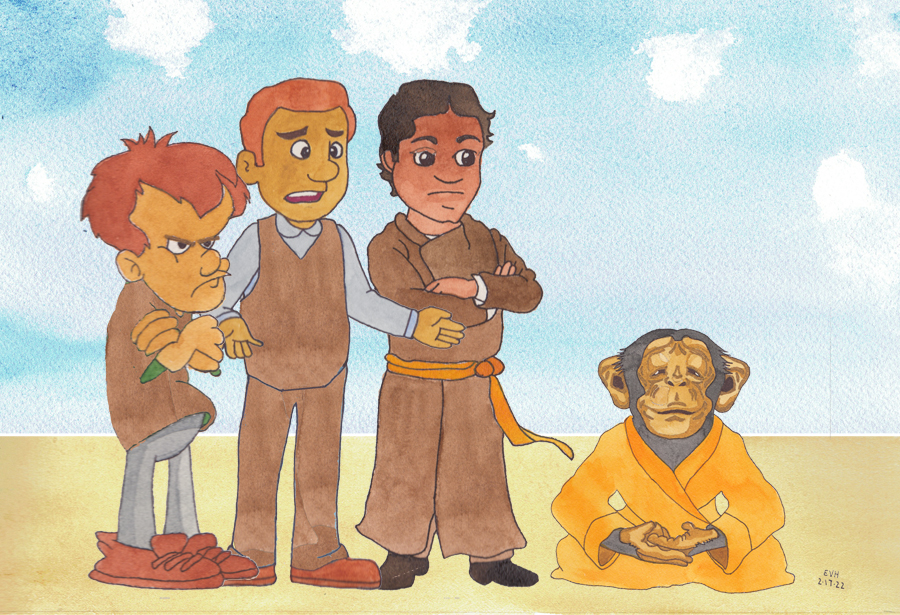
Jataka 299
Komāya Putta Jātaka
Komāya’s Son
as told by Eric Van Horn
originally translated by William Henry Denham Rouse, Cambridge University
originally edited by Professor Edward Byles Cowell, Cambridge University
This is a story about ill-behaved monks. As lay people we often tend to idealized the behavior of monastics. But I have heard some pretty atrocious stories about behavior in monasteries. There are plenty of these stories in the Pāli Canon as well.
“This is how you used to be.” The Master told this story in Pubbārāma (a monastery outside of Sāvatthi near Jeta’s Grove. It was donated to the Saṇgha by Visākhā, one of the Buddha’s most prominent lay women disciples). It about some monks who were rude and rough in their manners. These monks, who lived on the floor below that where the Master was, talked of what they had seen and heard (gossiped), and they were quarrelsome and abusive.
The Master called Mahāmoggallāna (one of the Buddha’s two chief disciples who was known for his psychic powers) to him and told him to go startle them. The Elder rose in the air and just touched the foundation of the house with his great toe. It shook to the furthest edge of ocean! The monks were frightened to death and went and stood outside.
Their rough behavior became known in the Saṇgha. One day they got to talking about it in the Dharma Hall. “Friend, there are some monks who have retired to this house of refuge. They are rough and rude. They do not see the impermanence, sorrow, and the unreality of the world, nor do they do their duty.”
The Master came in and asked what they were discussing as they sat there. They told him. “This is not the first time, monks,” he said, "that they have been rough and rude. They were just the same before." And then he told them this story from the past.
Once upon a time, when Brahmadatta reigned as the King in Benares, the Bodhisatta was born as a brahmin’s son in a village. They named him Komāyaputta. By and by he went out and embraced the holy life in the region of the Himalaya Mountains.
There were some frivolous recluses who had built a hermitage in that region, and there they lived. But they did not make the effort to develop deep meditation or virtue. They gathered fruits from the woods to eat, then they would spend time laughing and joking and frolicking together. They had a monkey who was as ill- mannered as they. He gave them endless amusement by his mischief and antics.
They lived for a long time in that place, but eventually they had to go back among humans to get salt and other provisions. After they went away, the Bodhisatta lived in their dwelling place. The monkey played his pranks for him as he had done for the others. But the Bodhisatta snapped his fingers at him and lectured him disapprovingly, saying, “One who lives with well-trained recuses should behave properly. He should be well-advised in his actions and devoted to meditation.” And after that, the monkey was always virtuous and well-behaved.
After this, the Bodhisatta moved away. The other recluses returned with their salt and provisions. But the monkey no longer played his pranks for them. “What’s this, my friend?” they asked. “Why do you not frolic and play like you used to do?" One of them repeated the first stanza:
“Before this time you used to play
Where in this hut we hermits stay.
O monkey! as a monkey do,
When you behave we love not you.”

Figure: The wise monkey
On hearing this, the monkey repeated the second stanza:
“All perfect wisdom by the word
Of wise Komāya I have heard.
Think me renewed as my mind state
Now disposes me to meditate.”
Hereupon the recluse repeated the third:
“If seed upon the rock you sow,
Though rain should fall, it will not grow.
You may hear perfect wisdom still,
But meditate you never will.”
When the Master ended this discourse, he summed up the birth tale: “At that time the owner of the hut was the little monkey, the interloper was the big black monkey, and I was the tree spirit.”
